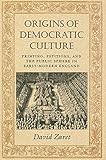Origins of Democratic Culture : Printing, Petitions, and the Public Sphere in Early-Modern England / David Zaret.
Material type: TextSeries: Princeton Studies in Cultural Sociology ; 11Publisher: Princeton, NJ : Princeton University Press, [2021]Copyright date: ©2000Description: 1 online resource (288 p.) : 16 halftonesContent type:
TextSeries: Princeton Studies in Cultural Sociology ; 11Publisher: Princeton, NJ : Princeton University Press, [2021]Copyright date: ©2000Description: 1 online resource (288 p.) : 16 halftonesContent type: - 9780691222592
- Civil society -- England -- History -- 17th century
- Democracy -- England -- History -- 17th century
- Public opinion -- England -- History -- 17th century
- HISTORY / Europe / Great Britain / General
- Assembly of Divines
- Bible or Bibles
- Buckinghamshire
- Burton, Robert
- Calhoun, Craig
- Canterbury (Kent)
- Catholics
- Charles I
- Chettle, Henry
- Cornwall
- Cromwell, Thomas
- Dering, Edward
- Dillingham, John
- Edward IV
- Erasmus, Desiderius
- Exclusion Crisis
- Filmer, Robert
- Fletcher, Phineas
- Giddens, Anthony
- Grand Remonstrance
- Hampden, John
- Henry VIII
- Herefordshire
- Hundred Years War
- James I
- Jenison, Robert
- Kent
- Lancashire
- Levellers
- Lincolnshire
- Locke, John
- Marx, Karl
- Oxford
- Parliamentarians
- Paston family
- Presbyterians
- alehouses
- apprentices
- assize sessions
- ballads
- book sellers
- censorship
- coffeehouses
- corantos
- deism
- fast sermons
- grievances
- inns or taverns
- journalists
- justices of the peace
- libels
- natural religion
- patronage
- 302.2/244/094209032 21
- JN191 .Z37 2000
- online - DeGruyter
| Item type | Current library | Call number | URL | Status | Notes | Barcode | |
|---|---|---|---|---|---|---|---|
 eBook
eBook
|
Biblioteca "Angelicum" Pont. Univ. S.Tommaso d'Aquino Nuvola online | online - DeGruyter (Browse shelf(Opens below)) | Online access | Not for loan (Accesso limitato) | Accesso per gli utenti autorizzati / Access for authorized users | (dgr)9780691222592 |
Frontmatter -- Contents -- List of Illustrations -- Acknowledgments -- Abbreviations -- Chapter One Introduction -- Chapter Two Theory and History -- Chapter Three Secrecy and Privilege -- Chapter Four Traditional Communicative Practice -- Chapter Five News -- Chapter Six Printing and the Culture of Print -- Chapter Seven Printing and Politics in the 1640s -- Chapter Eight Petitions -- Chapter Nine Epilogue -- Index
restricted access online access with authorization star
http://purl.org/coar/access_right/c_16ec
This innovative work of historical sociology locates the origins of modern democratic discourse in the emergent culture of printing in early modern England. For David Zaret, the key to the rise of a democratic public sphere was the impact of this culture of printing on the secrecy and privilege that shrouded political decisions in seventeenth-century England. Zaret explores the unanticipated liberating effects of printing and printed communication in transforming the world of political secrecy into a culture of open discourse and eventually a politics of public opinion. Contrary to those who locate the origins of the public sphere in the philosophical tracts of the French Enlightenment, Zaret claims that it originated as a practical accomplishment, propelled by economic and technical aspects of printing--in particular heightened commercialism and increased capacity to produce texts. Zaret writes that this accomplishment gained impetus when competing elites--Royalists and Parliamentarians, Presbyterians and Independents--used printed material to reach the masses, whose leaders in turn invoked the authority of public opinion to lobby those elites. Zaret further shows how the earlier traditions of communication in England, from ballads and broadsides to inn and alehouse conversation, merged with the new culture of print to upset prevailing norms of secrecy and privilege. He points as well to the paradox for today's critics, who attribute the impoverishment of the public sphere to the very technological and economic forces that brought about the means of democratic discourse in the first place.
Mode of access: Internet via World Wide Web.
In English.
Description based on online resource; title from PDF title page (publisher's Web site, viewed 29. Nov 2021)


